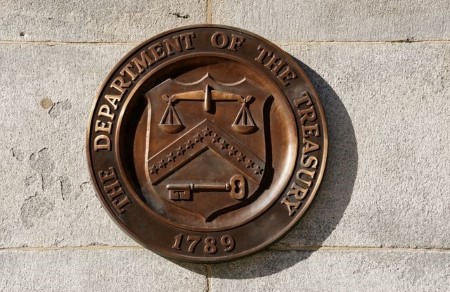




January Economic Update: Growth slows, prices rise
 DOWNLOAD
DOWNLOAD

Inflation Update: Up, up, and away?
 DOWNLOAD
DOWNLOAD

Quarterly Economic Growth Release: Growth takes on a slower pace
 DOWNLOAD
DOWNLOAD


Yields drop in choppy trading after court blow to Trump tariffs

NEW YORK – US Treasury yields fell on Thursday on soft economic data and on the back of a court ruling blocking most of President Donald Trump’s tariffs, which initially boosted risk sentiment in markets before reigniting fears over prolonged trade policy uncertainty.
A US trade court blocked most of Trump’s tariffs in a sweeping ruling on Wednesday that found the president overstepped his authority by imposing across-the-board duties on imports from US trading partners. On Thursday afternoon, a U.S appeals court reinstated the tariffs during the appeal.
Treasury yields, which rise when prices fall, jumped overnight as US stock futures rallied, but the bond selloff lost steam in early trade on Thursday, with yields then turning lower after the release of weekly jobs data and first-quarter gross domestic product estimates that showed underlying weakness in the economy.
“Overnight, once you first got the news, equity markets took off, yields sold off, then I think there was a more nuanced reaction to it,” said Noel McElreath, senior portfolio manager for US fixed income at Xponance.
Economists largely expect tariffs to be a drag on economic growth and to increase price pressures, therefore potential relief from higher import duties would be less inflationary, which would be positive for the bond market. At the same time, lower tariffs than anticipated could reduce revenues, potentially intensifying concerns over the US fiscal health.
For the time being, after the Trump administration filed a notice of appeal and questioned the authority of the court, investors will have to contend with heightened uncertainty over the final shape of US trade policies.
“Is it really a coast clear? Trump never goes down without punching so I would imagine there’s going to be another few weeks of some chaotic headlines,” said John Luke Tyner, head of fixed income and portfolio manager at Aptus Capital Advisors.
On the economic front, data from the Labor Department on Thursday showed the number of Americans filing new applications for unemployment benefits increased more than expected last week, while the jobless rate appeared to have picked up in May as labor market conditions continue to ease.
A second reading from the Commerce Department showed gross domestic product contracted 0.2% in the first quarter, less than a 0.3% forecast by economists polled by Reuters, but consumer spending was weaker.
“The data is getting more dovish, even with GDP revised up a bit,” David Russell, global head of market strategy at TradeStation, said in a note. “Consumer spending was weaker than expected … These numbers may increase odds of rate cuts sooner rather than later.”
The probability the Federal Reserve would cut rates by 25 basis points to a 4%-4.25% range at its September meeting increased to 53% on Thursday from 48% on Wednesday, CME Group data showed, with a total of two 25-bps cuts priced in for 2025.
Trump, in a private meeting at the White House on Thursday, told Fed Chair Jerome Powell that he was making a “mistake” by not lowering interest rates, delivering in person a view he has expressed publicly for months now. Powell at the meeting emphasized that monetary policy depends on economic data, the Fed said in a statement.
Meanwhile, without commenting directly on the tariff court ruling, Chicago Fed President Austan Goolsbee on Thursday said that if big tariffs could be avoided, either through trade deals or otherwise, the US central bank could likely cut interest rates given the underlying strength of the economy and the direction of inflation.
Benchmark 10-year yields were last at 4.426%, about five basis points down on the day. Two-year yields fell by roughly the same amount to 3.941%.
On Thursday, the Treasury Department sold USD 44 billion seven-year notes in the last leg of this week’s Treasury auctions, which included two-year and five-year notes and met good demand.
The seven-year notes were sold with a high yield of 4.194%, over two basis points below the market at the time of bidding in a sign that investors were willing to pay up to secure them.
(Reporting by Davide Barbuscia; Editing by Emelia Sithole-Matarise and Will Dunham)
This article originally appeared on reuters.com





 By Reuters
By Reuters